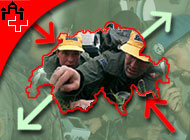Military vote seen as test for UN membership decision

The vote on June 10 on whether to allow Swiss soldiers to carry weapons abroad is being seen as a test of the Swiss public's enthusiasm for closer ties with the international community.
Observers have said that a “no” vote in Sunday’s referendum could set back the chances of Switzerland joining the United Nations – an issue due to come to the vote next year.
Although the Swiss government’s policy goals include membership of the UN and European Union, Swiss voters have traditionally shown little enthusiasm for joining these organisations.
The vote on allowing Swiss troops greater flexibility to take part in international peacekeeping missions is opposed by many of the same people who prefer to keep Switzerland out of the UN and EU.
Professor Curt Gasteyger, of Geneva’s Graduate Institute of International Studies, believes the votes will be an important indication of the Swiss mood regarding greater international cooperation.
“They will define Switzerland’s image abroad as a participating country,” says Gasteyger. “And they will define the way the Swiss think about themselves and about their role in peacekeeping operations.”
Since the end of the Cold War Switzerland has been trying to re-define the role of its army in order to reflect the changed world order. But the country’s traditional neutrality limits the activities permitted to Swiss soldiers.
Although some Swiss troops have been taking part in the international peacekeeping mission in Kosovo, they have been forced to operate under the protection of Austrian forces because Swiss soldiers are not permitted to carry weapons abroad.
The new legislation, if approved, would allow Swiss troops to carry weapons, and permit the Swiss army to take part in military training operations with NATO forces.
Gasteyger fears that if voters reject the proposals, it could have a damaging effect on Switzerland’s international standing.
“There will be countries who say: ‘well that’s the Swiss, they say no again’. And there will be others who go further, who will say the Swiss want a free ride; that they don’t want to go into peacekeeping operations at all, and therefore they don’t care about peace as much as we do.”
Gasteyger believes that Switzerland’s European neighbours will be watching the outcome of the vote closely. “You could say that perhaps many countries don’t regard Switzerland as worth paying attention to, but I think in this case Germany, Austria, and Italy will be very interested in the results of this vote. They are interested in what Switzerland will do with its military.”
The United States is also watching the vote, says Gasteyeger. “I understand that the Americans are very interested in seeing a greater commitment from the Swiss in peacekeeping operations – I think their interest probably has a lot to do with the recent difficult relations between Switzerland and the United States over the issue of Swiss financial dealings during the Second World War.”
At the root of the dilemma, says Gasteyger, is the concept of Swiss neutrality. “The problem is that the rest of the world doesn’t really understand it, and even we Swiss argue about what it really means. Some say we should adapt it to the changing times, while others point out that it has served us very well for many years, so we should leave it as it is.”
Gasteyger himself is convinced that Switzerland needs to adopt a more flexible approach to neutrality and to its role in the international community.
“The outcome of this vote will have repercussions for our vote on whether or not we join the United Nations,” he says.
“In my view Switzerland should become more open; we should define neutrality in a much more flexible way, and become more active in conflict prevention and peacekeeping. I suppose this could happen in the next four or five years. It is a slow process, but I hope it will go in the right direction.”
Swiss voters rejected membership of the UN in a referendum in 1986, although Switzerland is active in many UN agencies.
by Imogen Foulkes

In compliance with the JTI standards
More: SWI swissinfo.ch certified by the Journalism Trust Initiative
You can find an overview of ongoing debates with our journalists here . Please join us!
If you want to start a conversation about a topic raised in this article or want to report factual errors, email us at english@swissinfo.ch.